University Research Ethics Report for EDUC 723 Course
VerifiedAdded on 2022/08/23
|5
|918
|21
Report
AI Summary
This report delves into the crucial aspects of research ethics, specifically focusing on studies involving human participants. It addresses the ethical responsibilities of researchers, emphasizing the importance of informed consent, ensuring voluntary participation, maintaining data confidentiality, and obtaining necessary permissions for data recording and storage. The report highlights the context of the research, the Qatar Banking Studies and Business Administration Secondary School for Girls (QBSBASG), and the potential conflicts of interest when the researcher is also an employee of the organization. It provides a detailed discussion on how to mitigate potential biases, address concerns about participant coercion, and ensure the integrity and validity of the research. The report references various sources and provides recommendations for conducting ethical research practices.
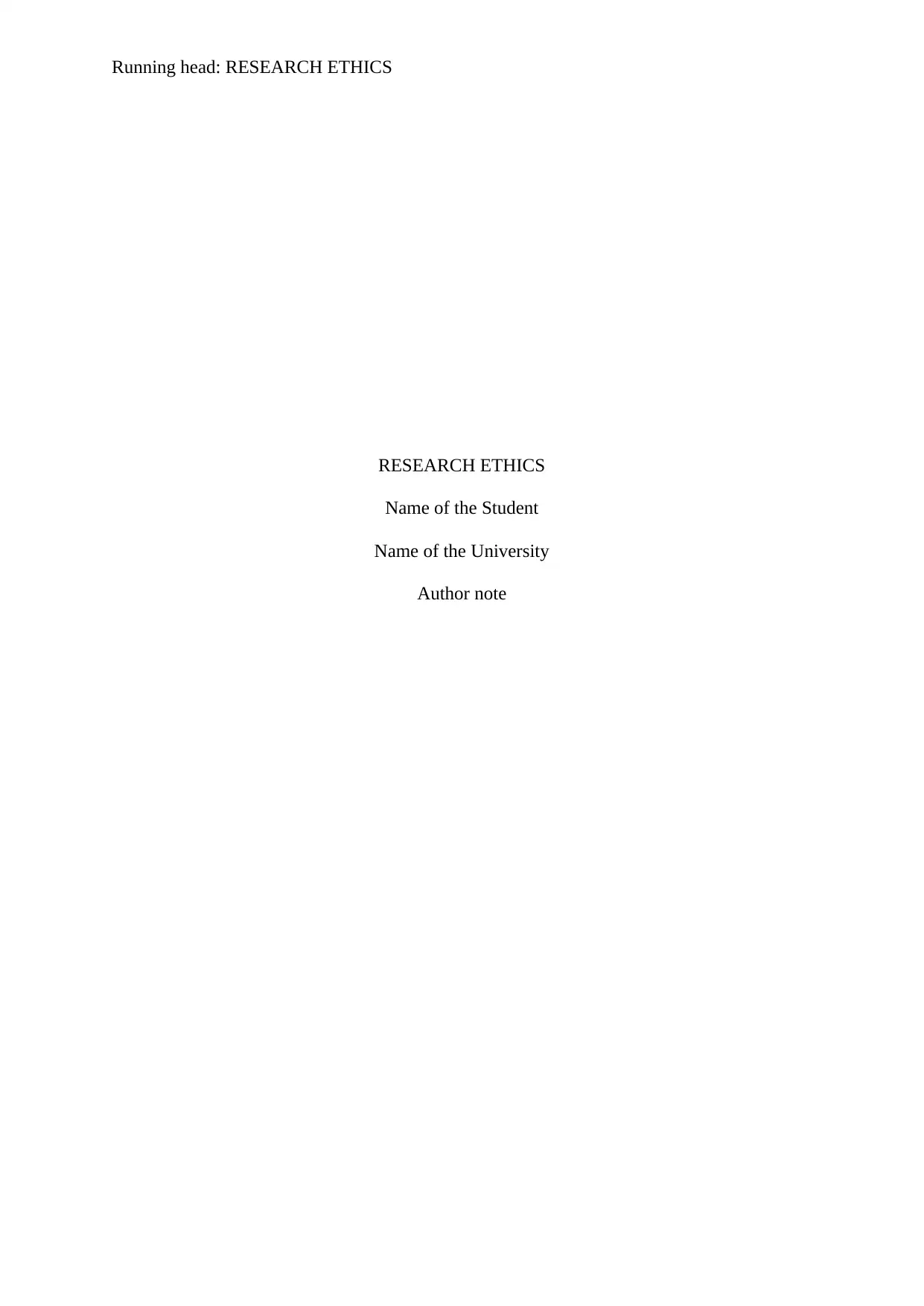
Running head: RESEARCH ETHICS
RESEARCH ETHICS
Name of the Student
Name of the University
Author note
RESEARCH ETHICS
Name of the Student
Name of the University
Author note
Paraphrase This Document
Need a fresh take? Get an instant paraphrase of this document with our AI Paraphraser
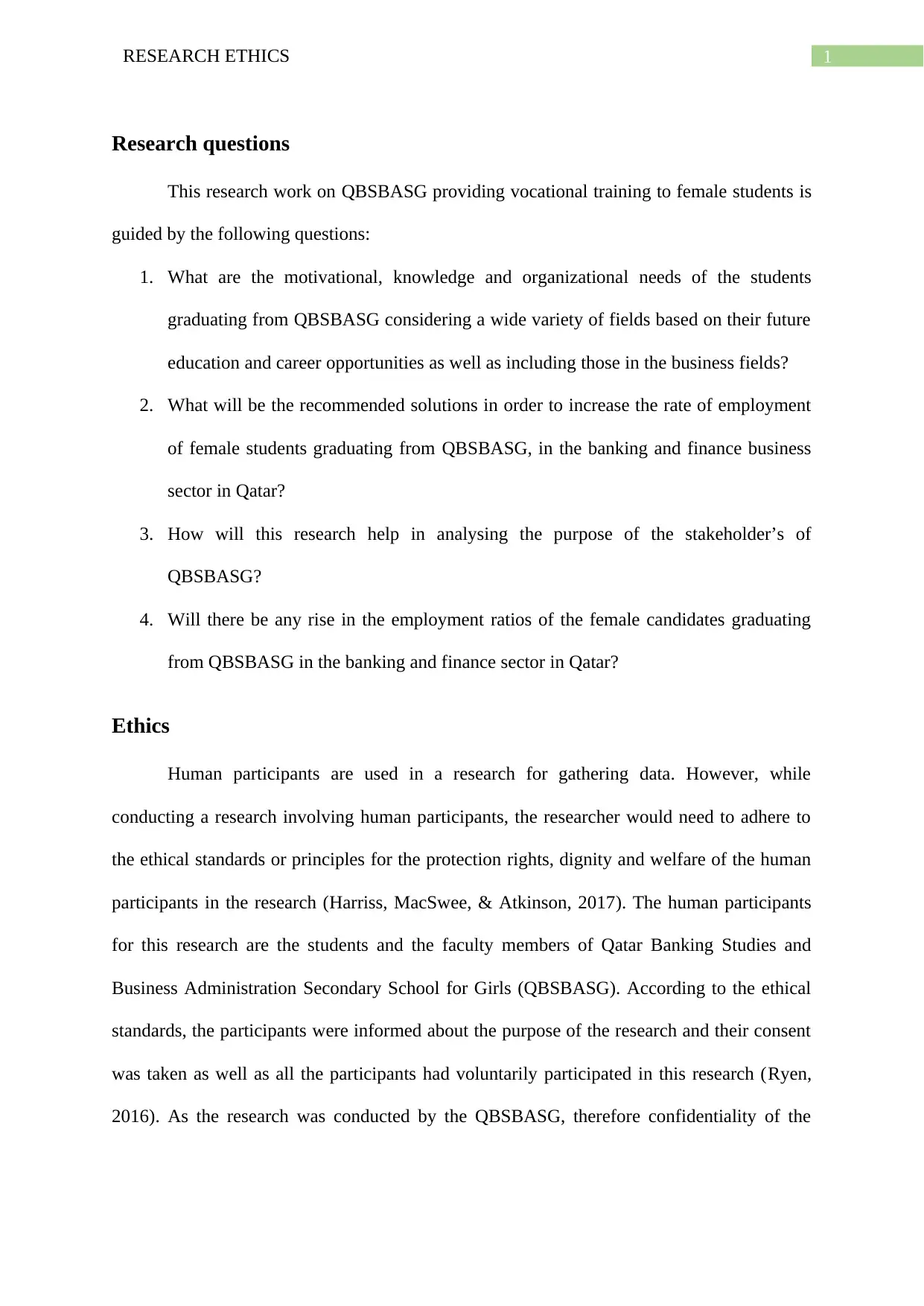
1RESEARCH ETHICS
Research questions
This research work on QBSBASG providing vocational training to female students is
guided by the following questions:
1. What are the motivational, knowledge and organizational needs of the students
graduating from QBSBASG considering a wide variety of fields based on their future
education and career opportunities as well as including those in the business fields?
2. What will be the recommended solutions in order to increase the rate of employment
of female students graduating from QBSBASG, in the banking and finance business
sector in Qatar?
3. How will this research help in analysing the purpose of the stakeholder’s of
QBSBASG?
4. Will there be any rise in the employment ratios of the female candidates graduating
from QBSBASG in the banking and finance sector in Qatar?
Ethics
Human participants are used in a research for gathering data. However, while
conducting a research involving human participants, the researcher would need to adhere to
the ethical standards or principles for the protection rights, dignity and welfare of the human
participants in the research (Harriss, MacSwee, & Atkinson, 2017). The human participants
for this research are the students and the faculty members of Qatar Banking Studies and
Business Administration Secondary School for Girls (QBSBASG). According to the ethical
standards, the participants were informed about the purpose of the research and their consent
was taken as well as all the participants had voluntarily participated in this research (Ryen,
2016). As the research was conducted by the QBSBASG, therefore confidentiality of the
Research questions
This research work on QBSBASG providing vocational training to female students is
guided by the following questions:
1. What are the motivational, knowledge and organizational needs of the students
graduating from QBSBASG considering a wide variety of fields based on their future
education and career opportunities as well as including those in the business fields?
2. What will be the recommended solutions in order to increase the rate of employment
of female students graduating from QBSBASG, in the banking and finance business
sector in Qatar?
3. How will this research help in analysing the purpose of the stakeholder’s of
QBSBASG?
4. Will there be any rise in the employment ratios of the female candidates graduating
from QBSBASG in the banking and finance sector in Qatar?
Ethics
Human participants are used in a research for gathering data. However, while
conducting a research involving human participants, the researcher would need to adhere to
the ethical standards or principles for the protection rights, dignity and welfare of the human
participants in the research (Harriss, MacSwee, & Atkinson, 2017). The human participants
for this research are the students and the faculty members of Qatar Banking Studies and
Business Administration Secondary School for Girls (QBSBASG). According to the ethical
standards, the participants were informed about the purpose of the research and their consent
was taken as well as all the participants had voluntarily participated in this research (Ryen,
2016). As the research was conducted by the QBSBASG, therefore confidentiality of the
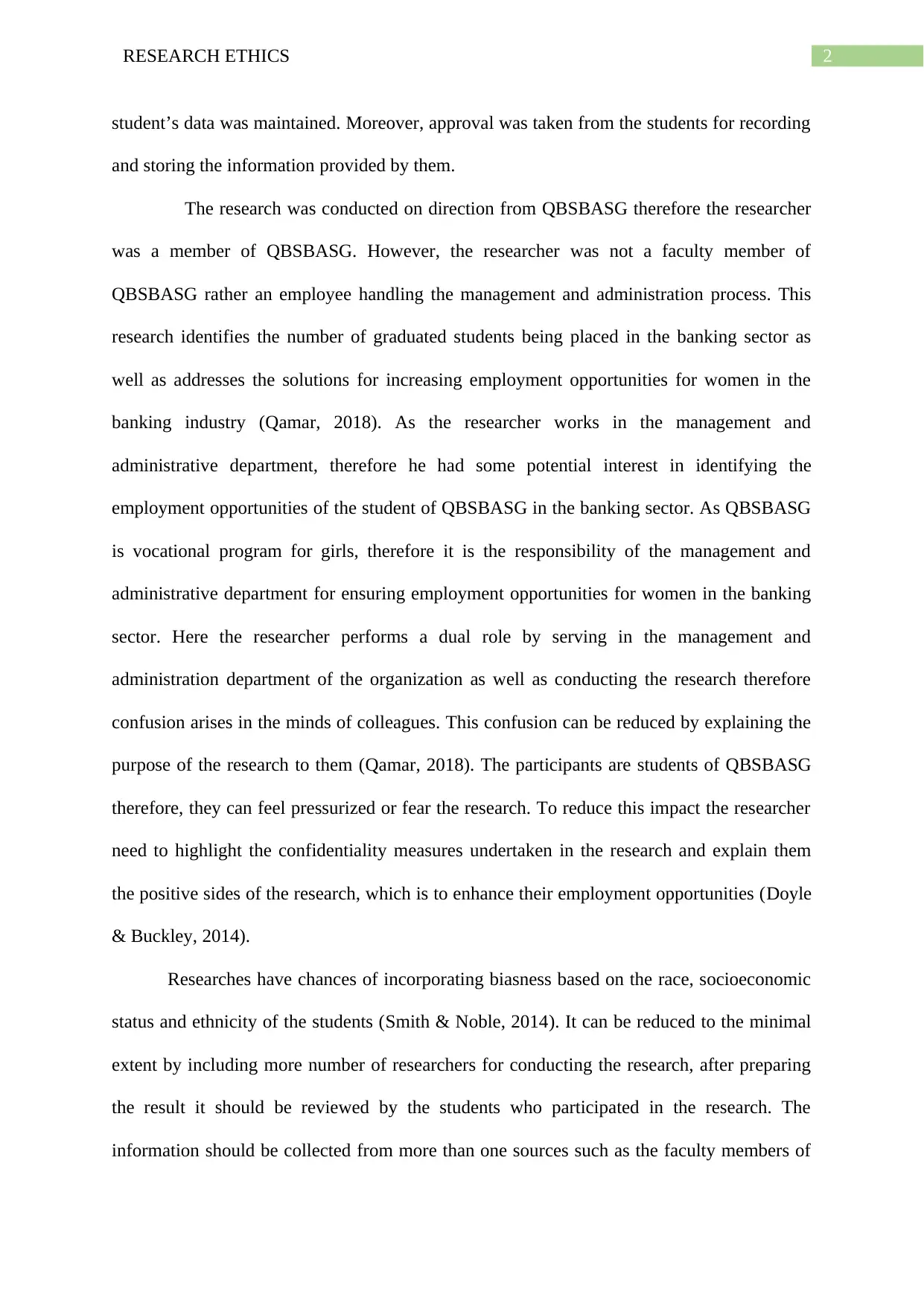
2RESEARCH ETHICS
student’s data was maintained. Moreover, approval was taken from the students for recording
and storing the information provided by them.
The research was conducted on direction from QBSBASG therefore the researcher
was a member of QBSBASG. However, the researcher was not a faculty member of
QBSBASG rather an employee handling the management and administration process. This
research identifies the number of graduated students being placed in the banking sector as
well as addresses the solutions for increasing employment opportunities for women in the
banking industry (Qamar, 2018). As the researcher works in the management and
administrative department, therefore he had some potential interest in identifying the
employment opportunities of the student of QBSBASG in the banking sector. As QBSBASG
is vocational program for girls, therefore it is the responsibility of the management and
administrative department for ensuring employment opportunities for women in the banking
sector. Here the researcher performs a dual role by serving in the management and
administration department of the organization as well as conducting the research therefore
confusion arises in the minds of colleagues. This confusion can be reduced by explaining the
purpose of the research to them (Qamar, 2018). The participants are students of QBSBASG
therefore, they can feel pressurized or fear the research. To reduce this impact the researcher
need to highlight the confidentiality measures undertaken in the research and explain them
the positive sides of the research, which is to enhance their employment opportunities (Doyle
& Buckley, 2014).
Researches have chances of incorporating biasness based on the race, socioeconomic
status and ethnicity of the students (Smith & Noble, 2014). It can be reduced to the minimal
extent by including more number of researchers for conducting the research, after preparing
the result it should be reviewed by the students who participated in the research. The
information should be collected from more than one sources such as the faculty members of
student’s data was maintained. Moreover, approval was taken from the students for recording
and storing the information provided by them.
The research was conducted on direction from QBSBASG therefore the researcher
was a member of QBSBASG. However, the researcher was not a faculty member of
QBSBASG rather an employee handling the management and administration process. This
research identifies the number of graduated students being placed in the banking sector as
well as addresses the solutions for increasing employment opportunities for women in the
banking industry (Qamar, 2018). As the researcher works in the management and
administrative department, therefore he had some potential interest in identifying the
employment opportunities of the student of QBSBASG in the banking sector. As QBSBASG
is vocational program for girls, therefore it is the responsibility of the management and
administrative department for ensuring employment opportunities for women in the banking
sector. Here the researcher performs a dual role by serving in the management and
administration department of the organization as well as conducting the research therefore
confusion arises in the minds of colleagues. This confusion can be reduced by explaining the
purpose of the research to them (Qamar, 2018). The participants are students of QBSBASG
therefore, they can feel pressurized or fear the research. To reduce this impact the researcher
need to highlight the confidentiality measures undertaken in the research and explain them
the positive sides of the research, which is to enhance their employment opportunities (Doyle
& Buckley, 2014).
Researches have chances of incorporating biasness based on the race, socioeconomic
status and ethnicity of the students (Smith & Noble, 2014). It can be reduced to the minimal
extent by including more number of researchers for conducting the research, after preparing
the result it should be reviewed by the students who participated in the research. The
information should be collected from more than one sources such as the faculty members of
⊘ This is a preview!⊘
Do you want full access?
Subscribe today to unlock all pages.

Trusted by 1+ million students worldwide
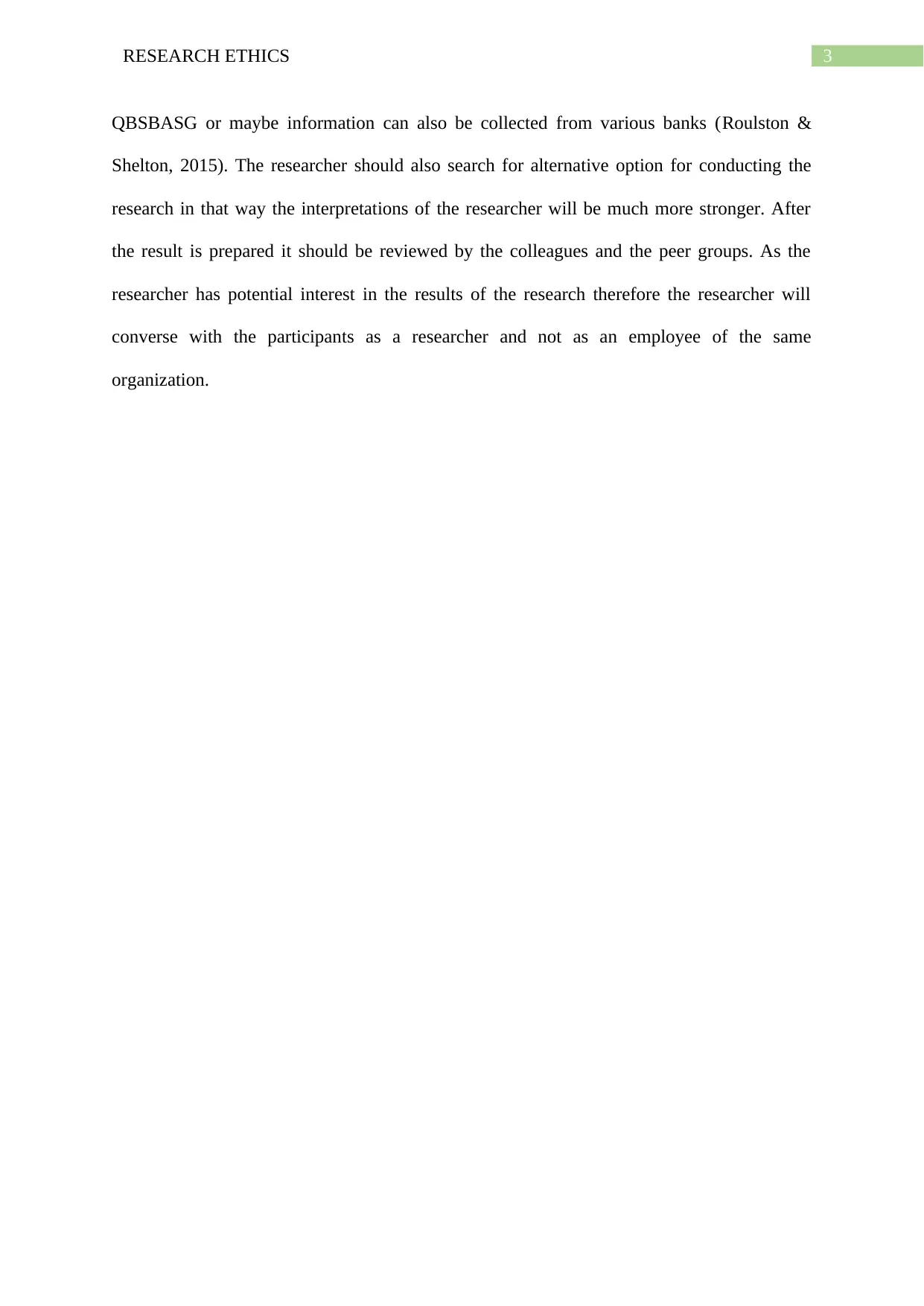
3RESEARCH ETHICS
QBSBASG or maybe information can also be collected from various banks (Roulston &
Shelton, 2015). The researcher should also search for alternative option for conducting the
research in that way the interpretations of the researcher will be much more stronger. After
the result is prepared it should be reviewed by the colleagues and the peer groups. As the
researcher has potential interest in the results of the research therefore the researcher will
converse with the participants as a researcher and not as an employee of the same
organization.
QBSBASG or maybe information can also be collected from various banks (Roulston &
Shelton, 2015). The researcher should also search for alternative option for conducting the
research in that way the interpretations of the researcher will be much more stronger. After
the result is prepared it should be reviewed by the colleagues and the peer groups. As the
researcher has potential interest in the results of the research therefore the researcher will
converse with the participants as a researcher and not as an employee of the same
organization.
Paraphrase This Document
Need a fresh take? Get an instant paraphrase of this document with our AI Paraphraser
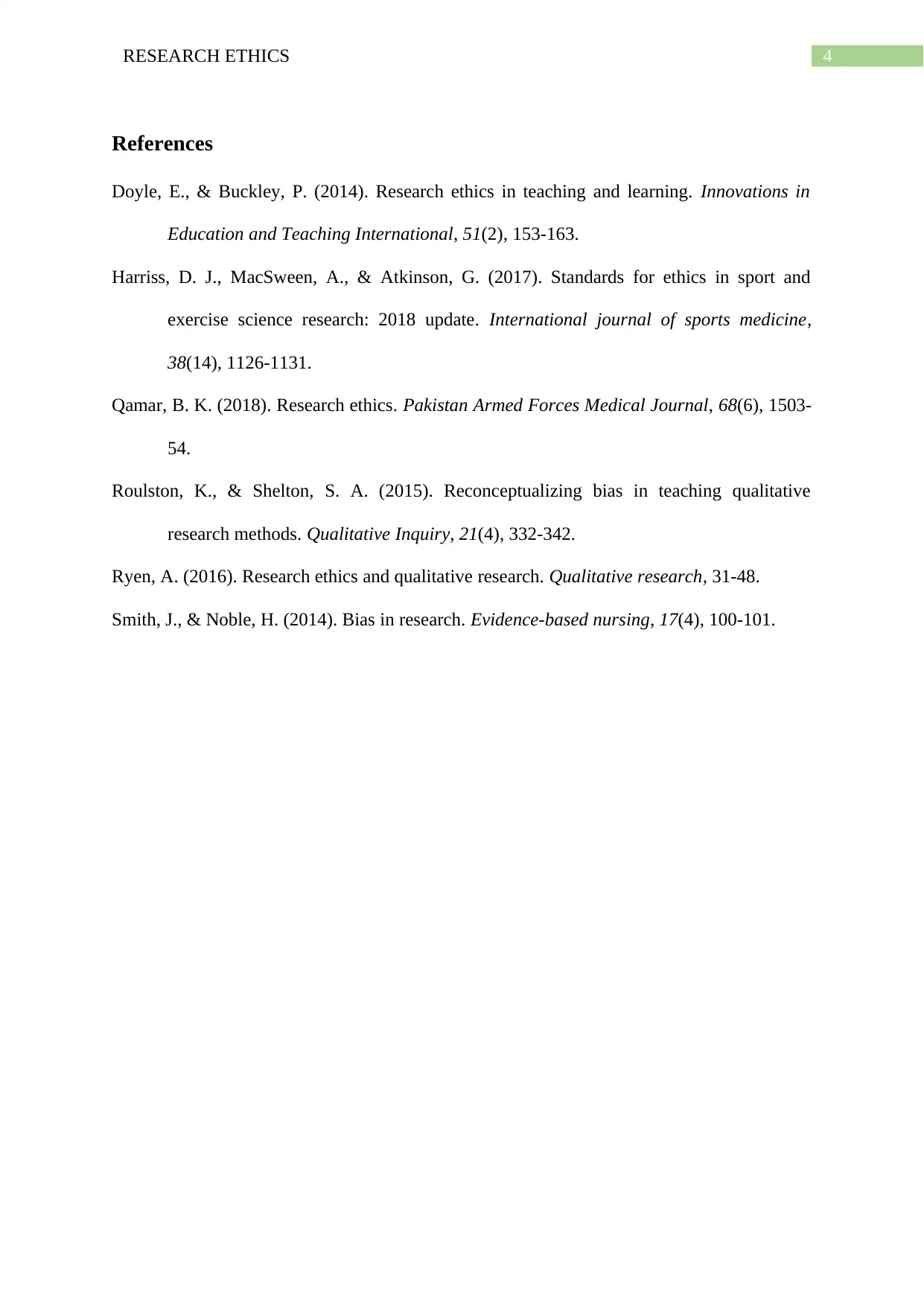
4RESEARCH ETHICS
References
Doyle, E., & Buckley, P. (2014). Research ethics in teaching and learning. Innovations in
Education and Teaching International, 51(2), 153-163.
Harriss, D. J., MacSween, A., & Atkinson, G. (2017). Standards for ethics in sport and
exercise science research: 2018 update. International journal of sports medicine,
38(14), 1126-1131.
Qamar, B. K. (2018). Research ethics. Pakistan Armed Forces Medical Journal, 68(6), 1503-
54.
Roulston, K., & Shelton, S. A. (2015). Reconceptualizing bias in teaching qualitative
research methods. Qualitative Inquiry, 21(4), 332-342.
Ryen, A. (2016). Research ethics and qualitative research. Qualitative research, 31-48.
Smith, J., & Noble, H. (2014). Bias in research. Evidence-based nursing, 17(4), 100-101.
References
Doyle, E., & Buckley, P. (2014). Research ethics in teaching and learning. Innovations in
Education and Teaching International, 51(2), 153-163.
Harriss, D. J., MacSween, A., & Atkinson, G. (2017). Standards for ethics in sport and
exercise science research: 2018 update. International journal of sports medicine,
38(14), 1126-1131.
Qamar, B. K. (2018). Research ethics. Pakistan Armed Forces Medical Journal, 68(6), 1503-
54.
Roulston, K., & Shelton, S. A. (2015). Reconceptualizing bias in teaching qualitative
research methods. Qualitative Inquiry, 21(4), 332-342.
Ryen, A. (2016). Research ethics and qualitative research. Qualitative research, 31-48.
Smith, J., & Noble, H. (2014). Bias in research. Evidence-based nursing, 17(4), 100-101.
1 out of 5
Your All-in-One AI-Powered Toolkit for Academic Success.
+13062052269
info@desklib.com
Available 24*7 on WhatsApp / Email
![[object Object]](/_next/static/media/star-bottom.7253800d.svg)
Unlock your academic potential
Copyright © 2020–2026 A2Z Services. All Rights Reserved. Developed and managed by ZUCOL.
